Suivi et évaluation
La plupart des défis liés au suivi et à l’évaluation, comme la quantité insuffisante d’investissements et le manque de capacités, ne sont pas spécifiques à l’assistance monétaire, mais ceux qui le sont concernent principalement le suivi des résultats des transferts non affectés. La flexibilité des transferts monétaires peut compliquer la définition d’indicateurs de résultats appropriés, qui pourraient impliquer un mélange d’indicateurs spécifiques au secteur et transversaux. En parallèle, il existe des limitations au moment de collecter des données précises sur la manière dont les transferts monétaires sont dépensés.
Les signataires du Grand Bargain se sont engagés à garantir que des mécanismes de suivi et d’évaluation pertinents des transferts monétaires soient en place, et à assurer une meilleure compréhension des coûts, avantages, impacts et risques de cette modalité par rapport à d’autres. En partant de cet engagement, le chantier du Grand Bargain sur les transferts monétaires a établi plusieurs points d’action, dont le développement d’indicateurs de résultats communs pour les transferts monétaires à usages multiples, et des indicateurs pour l’analyse de l’optimisation des ressources. L’analyse systématique de l’optimisation des ressources a été rendue difficile par plusieurs facteurs, dont un manque d’approches approuvées, le besoin en données sur les résultats en termes de qualité et le caractère intensif de l’analyse.
Priorités actuelles
Dans le cadre des engagements du chantier du Grand Bargain sur les transferts monétaires, le CALP Network a co-dirigé (avec l’USAID et CRS) la mise au point d’indicateurs de résultats des transferts monétaires à usages multiples. Le projet à tester est actuellement disponible en anglais, espagnol et français, via la bibliothèque.
Initiatives associées
Contenu présenté

Indicateurs de résultats des transferts monétaires à usages multiples : Projet final à tester
Guides et outils
Les indicateurs présentés dans ce document se concentrent sur les principaux objectifs des TMUM humanitaires et sur les résultats auxquels les transferts monétaires à usages multiples peuvent le plus fortement contribuer. (Par exemple, certaines interventions en TMUM visent à relier les personnes aux systèmes de protection sociale après la fin du TMUM; mais nous n’avons pas inclus...

Monitoring 4 CTP: Monitoring Guidance for CTP in Emergencies
Guidelines and Tools
This guidance provides a central resource to promote a common understanding of the most important monitoring considerations for humanitarian projects using cash transfer programming (CTP). The primary audience for this guidance is field-level practitioners, from organisations directly involved in the design, implementation, monitoring, and accountability of projects using cash and vouchers...

Cost-Efficiency Analysis of Basic Needs Programs: Best Practice Guidance for Humanitarian Agencies
Guidelines and Tools
The Efficiency, Effectiveness and Value for Money Sub-Workstream is pleased to share the final output on Cost-Efficiency Analysis of Basic Needs Programs: Best Practice Guidance for Humanitarian Agencies (attached).
Cost-efficiency analysis estimates the ratio of program costs to outputs created, allowing you to compare cost-per-output for programs which all produced the same output. Such...
Thematic lead
Contenu récent

Baseline Survey for Project Output and Livelihoods Support Assessment
Report
This report highlights the baseline findings of the UNHCR funded project “Increased self-reliance through cash interventions and livelihoods support to conflict-affected South Sudanese refugees in Bidibidi refugee settlement and host communities in Yumbe District in Uganda” implemented by...

Humanitarian Cash Transfers in the Democratic Republic of Congo
Report
The Democratic Republic of Congo (DRC) is at a crossroads with regard to cash transfers. On the one hand, cash has been accepted by most donors and aid agencies as an appropriate response, with solid evidence underpinning its use. Aid agencies have driven important innovations in an environment where...
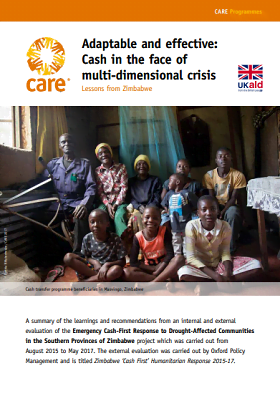
Adaptable and effective: Cash in the face of multi-dimensional crisis
Report
A summary of the learnings and recommendations from an internal and external evaluation of the Emergency Cash-First Response to Drought-Affected Communities in the Southern Provinces of Zimbabwe project which was carried out from August 2015 to May 2017. The external evaluation was carried out by Oxford...

Promoting positive parenting practices in Niger through a cash transfer programme
Report
In 2011, the Government of Niger set up a national social safety net
programme – the ‘Projet Filets Sociaux’. It includes unconditional cash transfers as well as behavioural change measures to promote investments in children. Lessons from programme implementation and evaluations so far highlight...
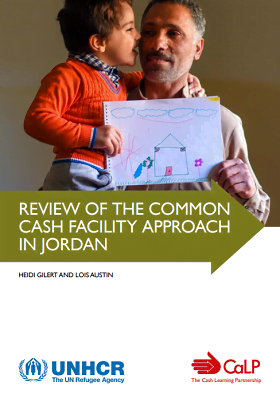
Review of the Common Cash Facility approach in Jordan
Report
The United Nations High Commissioner for Refugees (UNHCR) in Jordan has pioneered a collaborative, multi-stakeholder approach to the delivery of cash, known as the Common Cash Facility (CCF). The aim of the CCF is to provide humanitarian actors with direct and equal access to a common financial service...

Food or Cash or Vouchers? New report on U.S. food assistance monitoring and evaluation suggests “All of the above”
Blog Post
In this special blog Jenny Coneff, the CALP Network's North America Focal Point, reflects on the main findings of the GAO report.
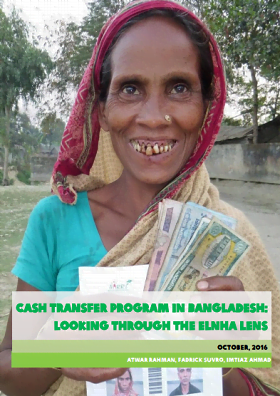
Cash Transfer Program In Bangladesh: Looking Through The ELNHA Lens
Report
Oxfam is implementing a multi-country humanitarian capacity building project titled as ‘’Empowering Local and National Humanitarian Actors (ELNHA)’’ in Bangladesh. This project is designed to use a variety of approaches that will enable local and national humanitarian actors (LNHAs) to take the...
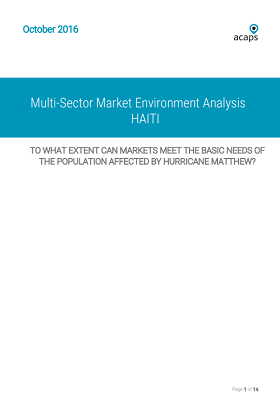
Multi-Sector Market Environment Analysis – Haiti. To what extent can markets meet the basic needs of the population affected by Hurricane Matthew
Report
Relief interventions in Haiti, including those to the 2010 earthquake, have been criticised for their (potential) harmful effect on the national market systems (ALNAP 2011 Humanitarian Coalition 2012). This multi-sector report intends to strengthen the understanding of the market environment in the...
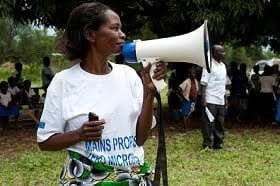
Documenting learning from cash transfer programming in the Ebola context
Blog Post
The CALP Network in West Africa is launching a new Cash and Ebola project that aims to optimize the use of CTP in future crises by documenting, analyzing and providing recommendations from the use of CTP in the Ebola Crisis.
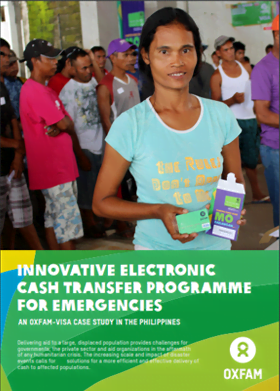
Innovative Electronic Cash Transfer Programme for Emergencies. An Oxfam Visa case study in Philippines
Report
On November 8, 2013, super Typhoon Haiyan (local name Yolanda) struck the Philippines, killing more than 6,000 people, and displacing an estimated 4.4 million individuals. Through its cash transfer programme, Oxfam conducted cash for work activities, and provided cash asset recovery to more than...

Evaluation of the Use of Different Transfer Modalities in ECHO Humanitarian Aid Actions 2011- 2014
Report
This report evaluates the use of different transfer modalities (cash transfers, vouchers, inkind transfers and combined modalities) in ECHO Humanitarian Aid actions between 2011 and 2014. The overall objective of the study is to identify opportunities to improve the cost effectiveness and cost...

MEB and SMEB Revision: Community Consultation
Report
The Lebanon Cash Consortium (LCC) is comprised of six INGOs that provide severely socio-economically vulnerable refugees with $175 worth of Multipurpose Cash Assistance (MCA) per month. The LCC uses a formula called the Proxy Means Tests (PMT), which generates a composite score representing economic...
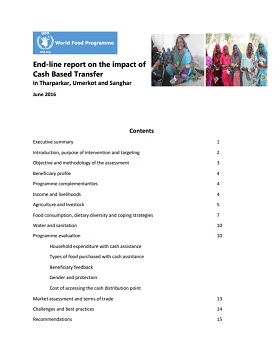
End-line report on the impact of Cash Based Transfer in Tharparkar, Umerkot and Sanghar
Report
The Food for Assets through Cashed Based Transfers was implemented in three drought affected districts of Sindh namely Tharparkar, Umerkot and Sanghar during the period from July 2015 to January 2016 covering 17,000 beneficiaries. The programme engaged beneficiary households in Cash for Training...
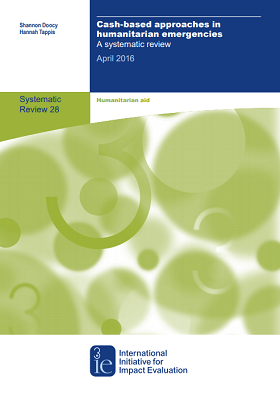
Cash-based approaches in humanitarian emergencies A systematic review. April 2016
Report
Humanitarian actors have a responsibility to ensure that assistance is provided in a way that minimizes risks and maximizes benefits to people affected by crisis. However, there are many challenges in evaluating ‘what works’ in addressing the needs of crisis-affected populations, and translating...
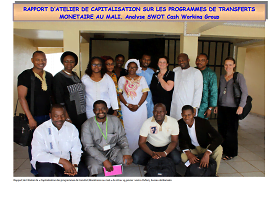
Rapport D’atelier De Capitalisation Sur Les Programmes De Transferts Monetaire Au Mali, Analyse SWOT Cash Working Group
Rapport
Dans le cadre de la mise en œuvre des programmes de transfert monétaire au Mali, a vu le jourun Groupe de travail appuyé par le CALP Network. Depuis 2013, sous l’impulsion d’Oxfam, de Save the Children et d’UNICEF, le Cash Working group a été mis en place au Mali. Oxfam assure le lead du Cash...
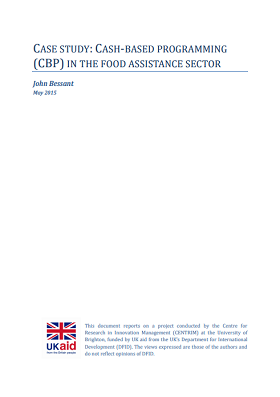
Case Study:Cash-based programming in the food assistance sector
Report
The purpose of this case study is to explore the pattern of innovation in the food supply and distribution area (i.e. not concerned with nutrition). The case raises some key policy issues: How to foster entrepreneurship and create enabling conditions for small-scale experiments and prototypes? How can...

Scale Right: Coordinating Improved Cash Assistance in Greece
Report
Europe is still reeling from the largest refugee crisis it has experienced since World War II. During the first half of 2015 Greece saw an average of 3,000 refugees arriving daily by sea onto the island of Lesvos. While the number of new arrivals—fleeing war in Syria, conflicts in Iraq, Afghanistan and...

UNHCR Cash Assistance: Improving refugees lives and supporting local economies
Report
UNHCR’s Cash-Based Interventions (CBI) support the most vulnerable Syrian refugees living within the host community in Jordan. Thanks to generous donor support last year, over 30,000 households received monthly cash assistance, winterisation cash, and cash for health, totalling nearly US $ 85 million....

Market Analysis and Outcome/Impact Measurement in Cash Transfer Programming in the WaSH and Shelter Sectors in Sudden Onset Disasters
Report
Over the past five years, cash transfer programming has become an increasingly popular modality of humanitarian intervention. Recently, unconditional and unrestricted MPGs have been increasingly championed as a default modality, based on evidence collected by organisations such as the...
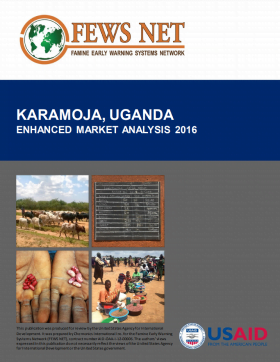
Karamoja, Uganda: Enhanced Market Analysis
Report
The Market Fundamentals reports serves as starting points for providing efficient and effective market-based response decision support for both emergency and development programs in Karamoja Region of Uganda. It examines the appropriateness and feasibility of modality response options for the region.
